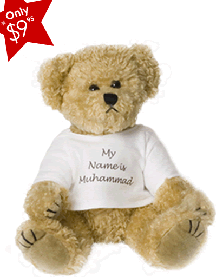
Following a link on the website www.korans.com can take you to the website www.teddybearmuhammad.com, which hawks the cute and cuddly namesake of Islam’s prophet. As the site explains, the bear commemorates the Sudanese government recently accusing 54-year old British schoolteacher Gillian Gibbons of blasphemy for “allowing” her class of 7-year old students at Khartoum’s Unity High School to choose what some considered the wrong name for the class stuffed animal. (The children named the bear after a popular classmate, not directly for the Prophet). The incident provided Sudanese politicians with an opportunity for local pandering, geopolitical bluster and a demonstration of sovereignty in reaction to international condemnation of the genocide in Darfur.
Cultural sensitivities about divine names and images are real, even when in particular instances they are feigned, exaggerated, or used as weapons in military or political conflicts. This reality is what gives their manipulation its potential power, although it also lays such manipulations open to exposure, derision, and failure. In this case, the Sudanese government claimed that some parents in Gibbons’ class complained to the country’s Ministry of Education about the incident in late November 2007 (the naming had taken place without incident in September). The school’s director recommended that the school be shuttered until January for fear of further reprisals. Gibbons was convicted in court for inciting religious hatred, but released early from a 15-day jail sentence. One can only admire the responsiveness of the Education ministry to parental concerns, and hope that they are as quick to act on other kinds of complaints from the families they serve.
What is interesting about Teddy Bear Muhammad is its resemblance, in its own softer, fuzzier way, to the Danish cartoon imbroglio of 2006, in which a newspaper intentionally printed insulting cartoons of the prophet Muhammad merely in order to show it could. Here, the anonymous marketers of Teddy Bear Muhammad (the website is registered through a proxy) attach the name Muhammad to their product as a “protest” against intolerance, but again, largely to demonstrate that the “we” of the tolerant West feel comfortable in using the images and names of sacred figures–particularly, but not solely, those of other peoples’ traditions–any way we jolly well please.
To be fair, both Muslims and non-Muslims hawk any number of products bearing sacred names (see, for example, my article on the topic in the March 1995 issue of the journal American Anthropologist). Two of my current favorites from the world of internet commerce are the “A is for Allah” spaghetti strap tank top and the “I <heart> Allah” infant bib available at http://www.cafepress.com/buy/islamic. Although some such items are criticized by various Muslim audiences, the commercial impulse often proves stronger than religious scruples, which in any case change over time and vary dramatically in their tone across the Muslim world. This is not an issue differentiating “extremists” from “moderates”, but an issue differentiating communities both internally and internationally with respect to a number of political, social, cultural and philosophical considerations, particularly those having to do with the relationship between image, speech, writing, and the world of the sacred. (I’m reminded of Jewish friends who prefer to write “G-d” rather than “God,” in an approximation of the ancient reluctance to pronounce the Holy Name of the Hebrew tetragrammaton.) In the United States there used to be an analogous respect paid to the sacred symbol of the American flag. This respect has been destroyed not by leftie flag-burners, but by the very patriots who, since September 11th, 2001, have mounted flags and their images permanently on every available surface of public space, to be neglected, rained on, faded, frayed, tattered, and passively desecrated in ways that would have been unimaginable either to the veterans of past eras or to the legions of Boy Scouts who used to be drilled in the proper use and display of our national symbol.
Who is the audience for Teddy Bear Muhammad as an object? Civil Libertarians wanting to spice up their bookshelves? Multiculturalists wanting to introduce non-Muslim tykes to the World of Diversity? Muslim children too young for the modestly-dressing Barbie dolls Fulla or Razanne? Teddy bear enthusiasts searching for the latest style? Probably none of the above. TBM is less a plaything than an advertisement for self-congratulation, a move less frightening but every bit as cynical in its own small fuzzy way as the arrest and trial of Gillian Gibbons in Khartoum last November.
Portions of the proceeds from the sale of Teddy Bear Muhammad will allegedly be donated to the USO, the United Service Organization, which provides various kinds of support for American soldiers and their families serving or traveling abroad. Perhaps next time our troops in Afghanistan and Iraq are visited by a USO tour featuring Chuck Norris, Jamie Kennedy’s Hip Hop Comedy Tour, or the heavy metal band Drowning Pool performing songs from their album Desensitized, they can thank the Sudanese courts for inspiring Teddy Bear Muhammad.
Gregory Starrett